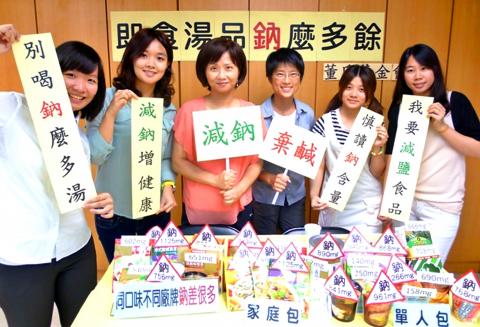It will be of no surprise that most Taiwanese are consuming too much sodium on a daily basis, but a large part comes from soups eaten with main meals, according to the John Tung Foundation.
The foundation said its recent survey of 147 ready-to-eat soup products sold on grocery shelves and in convenience stores showed that both family-size soup packages and regular serving packages contained approximately to 500 to 600 milligrams of sodium per person per serving.
Hsu Hui-yu (許惠玉), head of the foundation’s food nutrition section, said the recommended daily intake (RDI) of sodium is 2,400 milligrams per person per day, as suggested by the Ministry of Health and Welfare.

Photo: John tung foundation
However, according to nationwide health and nutrition studies, most people in Taiwan, from elementary school age upward, are ingesting twice the RDI amount on average. Hsu pointed out this may due to the Taiwanese habit of drinking soup during meals.
She said that the government of Finland stipulates soup products carry a warning if it exceeds 720 milligrams of sodium for 200ml single serving of soup.
“If we follow this standard, then nearly a fourth of all soup products surveyed would have to carry a warning,” Hsu said.
The foundation’s survey found that one single serving of Italian vegetable soup of the Day & Day brand contains 1,266 milligrams of sodium, while one serving of Carrefour’s in-house brand Hong Kong-style hot and sour soup contains 1,124 milligrams of sodium. Consuming two servings of the soups mentioned would almost exceed the daily intake limit for sodium.
“Most people’s taste buds aren’t sensitive enough to detect levels of salt. They are unable to assess the sodium content and that’s why people should read the product label,” Hsu said.
As part of its testing, the foundation got 11 people to try out creamy corn soup, seaweed egg drop soup and miso soup, with three to four different levels of saltiness for the three types of soup.
The tasters were told to rank the soups in terms of saltiness. The result indicated that seven of the 11 got almost all the rankings wrong, while the remaining four had less than half correct, Hsu said.
Chen Hsing-ho (陳醒荷), the foundation’s deputy chief of nutrition, reminded the public to buy instant soup products containing less than 400 milligrams of sodium.
“Family-size soup products have more salt so we recommend diluting the soup with water. Vegetables, egg and meat can also be added. This way more people can share it,” she said.

The Coast Guard Administration (CGA) yesterday said it had deployed patrol vessels to expel a China Coast Guard ship and a Chinese fishing boat near Pratas Island (Dongsha Island, 東沙群島) in the South China Sea. The China Coast Guard vessel was 28 nautical miles (52km) northeast of Pratas at 6:15am on Thursday, approaching the island’s restricted waters, which extend 24 nautical miles from its shoreline, the CGA’s Dongsha-Nansha Branch said in a statement. The Tainan, a 2,000-tonne cutter, was deployed by the CGA to shadow the Chinese ship, which left the area at 2:39pm on Friday, the statement said. At 6:31pm on Friday,

The Chinese People’s Liberation Army Navy’s (PLAN) third aircraft carrier, the Fujian, would pose a steep challenge to Taiwan’s ability to defend itself against a full-scale invasion, a defense expert said yesterday. Institute of National Defense and Security Research analyst Chieh Chung (揭仲) made the comment hours after the PLAN confirmed the carrier recently passed through the Taiwan Strait to conduct “scientific research tests and training missions” in the South China Sea. China has two carriers in operation — the Liaoning and the Shandong — with the Fujian undergoing sea trials. Although the PLAN needs time to train the Fujian’s air wing and

The American Institute in Taiwan (AIT) put Taiwan in danger, Ma Ying-jeou Foundation director Hsiao Hsu-tsen (蕭旭岑) said yesterday, hours after the de facto US embassy said that Beijing had misinterpreted World War II-era documents to isolate Taiwan. The AIT’s comments harmed the Republic of China’s (ROC) national interests and contradicted a part of the “six assurances” stipulating that the US would not change its official position on Taiwan’s sovereignty, Hsiao said. The “six assurances,” which were given by then-US president Ronald Reagan to Taiwan in 1982, say that Washington would not set a date for ending arm sales to Taiwan, consult

A Taiwanese academic yesterday said that Chinese Ambassador to Denmark Wang Xuefeng (王雪峰) disrespected Denmark and Japan when he earlier this year allegedly asked Japan’s embassy to make Taiwan’s representatives leave an event in Copenhagen. The Danish-language Berlingske on Sunday reported the incident in an article with the headline “The emperor’s birthday ended in drama in Copenhagen: More conflict may be on the way between Denmark and China.” It said that on Feb. 26, the Japanese embassy in Denmark held an event for Japanese Emperor Naruhito’s birthday, with about 200 guests in attendance, including representatives from Taiwan. After addressing the Japanese hosts, Wang